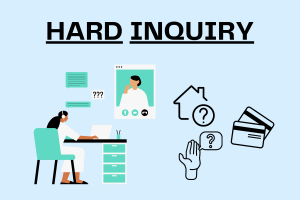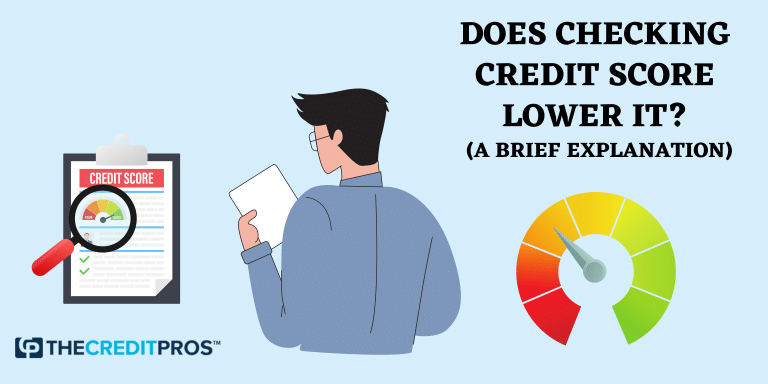Does Checking Credit Scores Lower It? 2 Types of Inquiries
Table of Contents
Does Checking Credit Scores Lower It? 2 Types of Inquiries
When it comes to getting approved for a loan, users often fear their credit score might be affected by being checked. It is a common and widely misunderstood statement that checking credit scores might lower it.
But, is that the case, or Have you been worrying about something that isn’t true?
Read on to find the answer to the question – does checking credit scores lower it? and test the credibility of the statement and the types of inquiries that do affect your credit score.
Credit Checks
A credit check is often done as a part of the loan or credit card application process. A lender must identify a borrower as a legitimate applicant for the loan. To do that, a borrower must apply and give access to their credit reports.
Credit scores are generally used to determine the creditworthiness of an individual. Lenders offer loans based on the credit score and other important criteria that a debtor has to meet for approval. If you fail to meet the credit score requirements, the application is rejected.
It is advisable that you check your credit scores at least once, every year. You can check your credit scores for free at the annual credit report website, using this link.
Types of Inquiry
Two types of inquiries can be made during a credit check. If you are not familiar with the terms, here is a brief explanation of the types of inquiries often called a soft and hard pull of your credit:
- Soft Inquiries
- Hard inquiries
An inquiry refers to the act of acquiring a credit report from the three major credit bureaus, such as Experian, TransUnion, and Equifax for the processing of a loan application. The credit report contains what credit accounts you have open, any loans you have, and any defaults or late payments you have made.
There is a common misconception that checking your credit score will reduce it by a few points. However, it is purely based on the type of inquiry made during credit checks. Let us briefly look at the types of inquiries in the upcoming section.
Soft Inquiry

Does Checking Credit Scores Lower It – Soft Inquiry
A soft inquiry is made when you raise a request to the three major credit bureaus for your credit report. You do not hurt your credit score by merely checking it for your reference. Regardless of the number of times you check your own credit score, there is no impact on the score when a soft inquiry is made.
Typically, soft inquiries are made for credit monitoring and assessing the credit history for any errors or for the sake of knowing the credit score range. The possible areas that might contain incorrect information on your credit report are personal information, transaction history, statements not being updated, and any other irregularities.
Checking credit reports for errors is not something new. According to consumer reports, 34% of the volunteers who applied for a credit check found errors in their credit reports. Therefore, it is both a precaution and a self-assessment act to do a credit report check, which is a soft credit inquiry.
Hard Inquiry

Does Checking Credit Scores Lower It – hard inquiry
Let’s say you are going to apply for an auto loan, mortgage loan, or home loan from a trusted loan provider. The very first thing you are asked for is your social security number so they can obtain your credit report which contains your credit history and score based on your debt management profile.
Whenever a loan provider contacts a credit bureau for a credit score check, it is considered a hard inquiry on your credit report. Hard credit inquiries have a negative impact on your credit score.
If you wonder about how many points your credit score will drop. According to Bankrate, your credit score might drop to a maximum of 10 points for a hard inquiry. However, in most cases, the change is not significant and people have got their scores reduced by 5 points or less.
Regarding the above information. you need to focus on improving your credit score to qualify for your application. Based on the credit scoring models of each lending agency, you will be approved for a line of credit or credit card.
What Do You Do After Receiving a Hard Inquiry On Your Credit File?
- The first thing you need to do is check whether the inquiry made on your credit report is from a legitimate financial institution, ensure that no false information has been accidentally entered.
- If you find any incorrect information made on payment history, credit accounts, personal details, or even an unauthorized hard inquiry, you can raise a dispute against the consumer credit bureaus to remove the inquiry from your credit file.
- In the worst case, it is possible that someone has committed identity theft on your profile to illegally approve a line of credit.
- Recovery from a hard inquiry takes up to two years to be removed. Remember that your score will not rise on the removal of hard credit inquiries.
- You need to take actions, such as regularly paying your bills or monthly payments, and maintaining a good credit utilization ratio, which can eventually lead you to increase your credit score to qualify for auto or personal loans.
Related Reads:
7 Things About Cosigners You Must Know in 2023
Fair Credit Score – 5 Best Ways To Improve Your Score
Is a 700 Credit Score Good or Bad? Tips to Increase Your Credit Score
Frequently Asked Questions
1. Does checking credit scores lower it permanently?
In case of a hard credit inquiry, a few points will be deducted from your credit score which usually stays on your report for a period of two years. You will lose only 5-10 points of your score.
2. Does my credit score reduce when loan providers request credit agencies for my credit score multiple times?
Generally during an exception case, like a new credit card or loan application, consecutive hard inquiries made by lenders are considered to be a single inquiry for 14-45 days (according to Equifax).
3. Can I check my credit score for free?
Use any one of the major credit reporting agencies, like Experian, Equifax, or TransUnion to do a free credit score check. To get your credit report, you can apply through the annual credit report website.
4. How many times can I check my credit score?
You can check your credit score as many times as you want by self-checking your credit reports. Multiple soft inquiries do not impact your credit score.
So, Does Checking Credit Scores Lower It?
I hope you’ve figured out the answer to the question does checking credit scores lower it?
We saw the types of inquiries that are possible during credit checks, and which of these two has a negative impact on credit scores. Next time you check your credit, you can stop worrying that it might affect your credit score, and focus on improving it for the better.
If you haven’t already tried repairing your score using a credit repair service company, you can try promising services from us.
TheCreditPros have been a credit repair services company for more than a decade, producing positive results for customers. Get a free consultation, and repair your credit score with the help of an AI-driven personal credit management system.


